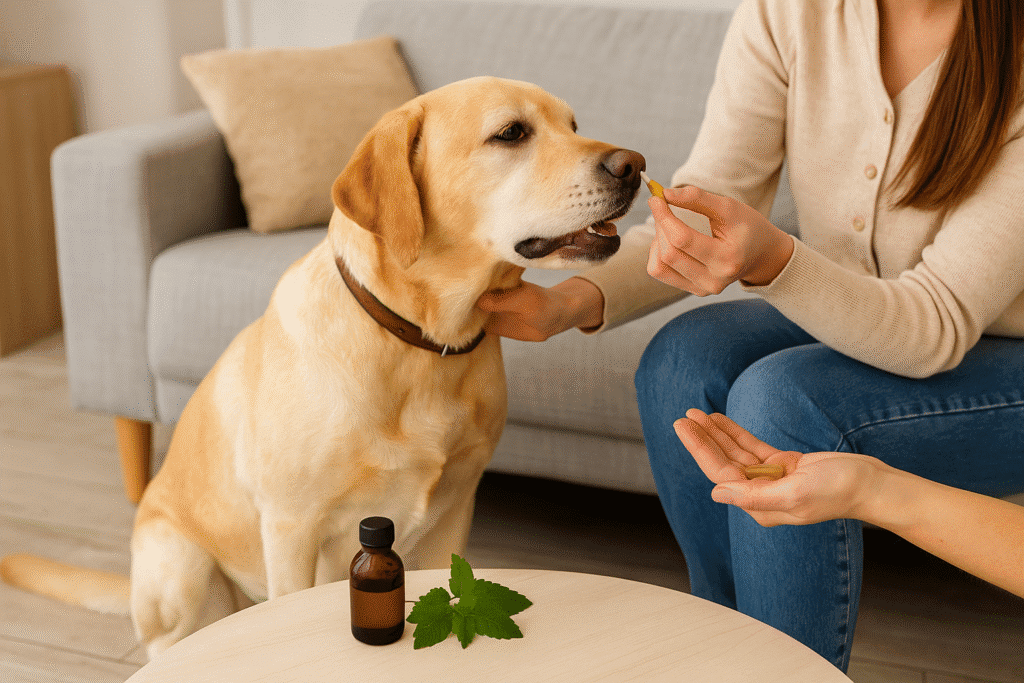This dog allergies explained guide covers everything you need to know about allergy triggers, symptoms, and treatment. Learn about environmental and food-related causes, how to recognize allergic reactions, and explore natural relief options to keep your dog comfortable and healthy.
Introduction
Allergies are one of the most common health problems in dogs, often leaving owners puzzled about the cause of their pet’s discomfort. This dog allergies explained guide breaks down the major triggers, symptoms, and practical relief strategies—so you can help your dog live a happier, itch-free life.
(Outbound link: Learn more about canine allergies at VCA Hospitals: Allergies in Dogs.)

Common Triggers of Dog Allergies
Dogs can develop allergies from a variety of environmental and dietary sources. Knowing the potential triggers helps you pinpoint the root of your dog’s discomfort.
- Environmental allergens: Pollen, mold spores, dust mites, and grasses.
- Food allergies: Proteins like beef, chicken, dairy, or wheat.
- Flea bites: Even one bite can trigger severe skin reactions (flea allergy dermatitis).
- Chemical irritants: Household cleaners, perfumes, or grooming products.
(Internal link: Learn more about Common Pet Allergies in our detailed guide.)
Symptoms of Dog Allergies
Allergic reactions vary but often manifest through the skin, digestive system, or respiratory system. Symptoms may be seasonal or year-round depending on the trigger.
- Persistent itching and scratching
- Red, inflamed, or flaky skin
- Frequent ear infections
- Excessive licking of paws
- Runny eyes or sneezing
- Gastrointestinal issues such as vomiting or diarrhea (food allergies)
(Internal link: For skin-related problems, see Dog Skin Problems & Solutions.)
How Vets Diagnose Dog Allergies
Because allergy symptoms overlap with other health issues, veterinary evaluation is essential. Vets use several methods:
- Physical examination: Checking skin, ears, and overall condition.
- Elimination diet: Removing potential food allergens step by step.
- Allergy testing: Blood tests or intradermal skin testing.
- Response to treatment: Observing whether symptoms improve after specific changes.

Natural Relief Options for Dog Allergies
While some dogs may require medication, natural remedies can provide relief and reduce reliance on drugs. Always consult your veterinarian before trying new treatments.
1. Dietary Adjustments
Switching to a limited-ingredient or hypoallergenic diet can reduce food allergy reactions. Look for formulas with novel proteins like venison or duck.
2. Omega-3 Fatty Acids
Supplements such as fish oil reduce inflammation and improve skin health.
3. Herbal Remedies
Chamomile and aloe vera (applied topically) may soothe itching. Quercetin, sometimes called “nature’s Benadryl,” is another natural option.
4. Probiotics
Gut health plays a big role in immunity. Adding probiotics may reduce allergic responses.
(Internal link: Learn about Dog Probiotics for Gut Health.)
5. Bathing and Grooming
Regular baths with hypoallergenic shampoos remove allergens from the coat. Wiping paws after walks helps limit pollen exposure.
(Outbound link: See more about itchy dogs at AKC: Why Is My Dog So Itchy?.)
Preventing Allergies in Dogs
Prevention strategies help minimize flare-ups and maintain long-term comfort.
- Use flea preventives year-round.
- Keep living areas clean with HEPA filters and frequent vacuuming.
- Avoid feeding table scraps that can trigger sensitivities.
- Introduce new diets gradually to spot food intolerances early.

Frequently Asked Questions (FAQ)
- What are the most common allergies in dogs?
Pollen, dust mites, fleas, and certain proteins like beef or chicken. - Can I treat dog allergies naturally?
Yes, with diet changes, omega-3 supplements, probiotics, and hypoallergenic grooming products. - When should I see a vet for allergies?
If symptoms persist more than a week, worsen, or cause skin infections. - Are some breeds more prone to allergies?
Yes, breeds like Bulldogs, Retrievers, and Terriers are more susceptible. - Can allergies be cured?
No, but they can be managed effectively with consistent care.
Conclusion
This dog allergies explained guide shows that while allergies can be frustrating, they are manageable with the right strategies. Identifying triggers, monitoring symptoms, and using natural remedies alongside veterinary care can help your dog live a comfortable, happy life.
Call to Action
Looking for more health insights? Explore our Pet Health collection here.


핑백: Dog Cough Remedies: Vet-Approved Home Treatments That Work Fast